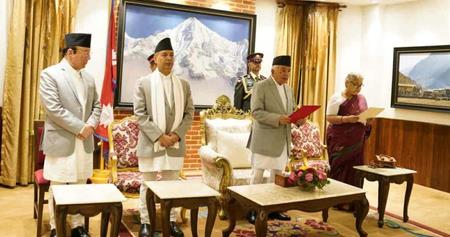India Committed To Peace And Prosperity: PM Modi Wishes Sushila Karki On Becoming Nepal's Interim PM
Sushila Karki, 73, was sworn in as Nepal's interim Prime Minister late on Friday evening, thus becoming the first-ever woman PM of the Himalayan nation.
Karki, also Nepal's first woman Chief Justice, took the oath of office administered by President Ram Chandra Poudel, who held extensive consultations with leaders of the Gen-Z protests, constitutional experts, and the Army chief throughout the day.
In a post on X, PM Modi said, "I extend my best wishes to Right Hon. Mrs. Sushila Karki on assuming office as the Prime Minister of the Interim Government of Nepal. India remains firmly committed to the peace, progress and prosperity of the people of Nepal."
Earlier in the day, India welcomed the formation of a new interim government in Nepal under the leadership of former Chief Justice Sushila Karki, expressing hope that the political transition would contribute to peace and stability.
In a statement released by the Ministry of External Affairs (MEA), it reiterated its commitment to strengthening ties with Kathmandu during this period of change.
"We welcome the formation of a new Interim Government in Nepal, led by Right Honourable Mrs Sushila Karki. We are hopeful that this would help in fostering peace and stability," the MEA said.
The ministry added, "As a close neighbour, a fellow democracy and a long-term development partner, India will continue to work closely with Nepal for the well-being and prosperity of our two peoples and countries."
Following the fall of the K.P. Sharma Oli-led government during the violent Gen-Z protests on Monday, Karki was the pick of activists who have taken to the streets, protesting against Oli's rule.
Discussions with Gen-Z protestors and other stakeholders were prolonged over the issue of dissolving the House of Representatives, the lower house, before the new Prime Minister is sworn in or after it.
Gen-Z protestors agreed on Karki's name, paving the way for her appointment as Prime Minister even though several non-political candidates were floated as alternatives.
There is, however, no constitutional provision allowing anyone who is not a member of the House of Representatives to hold the post. Karki has been appointed under the "principle of necessity".
According to Article 76 of Nepal's Constitution, only a member of the House of Representatives can become Prime Minister. This criterion disqualifies Karki, as even members of the National Assembly, the upper house of Parliament, are barred from holding the post.
Likewise, Article 132 (2) of the Constitution prevents her from becoming Prime Minister. It states that no person who has once held the office of Chief Justice or Judge of the Supreme Court shall be eligible for appointment to any government office, except as otherwise provided in the Constitution.

Legal Disclaimer:
MENAFN provides the
information “as is” without warranty of any kind. We do not accept
any responsibility or liability for the accuracy, content, images,
videos, licenses, completeness, legality, or reliability of the information
contained in this article. If you have any complaints or copyright
issues related to this article, kindly contact the provider above.
Most popular stories
Market Research

- Virtual Pay Group Secures Visa Principal Acquirer License
- UK Cosmetics And Personal Care Market To Reach USD 23.2 Billion By 2033
- BTCC Announces Participation In Token2049 Singapore 2025, Showcasing NBA Collaboration With Jaren Jackson Jr.
- 1Inch Unlocks Access To Tokenized Rwas Via Swap API
- Everstake Expands Institutional Solana Services With Shredstream, Swqos, And Validator-As-A-Service
- Primexbt Wins Global Forex Award For Best Multi-Asset Trading Platform






















Comments
No comment